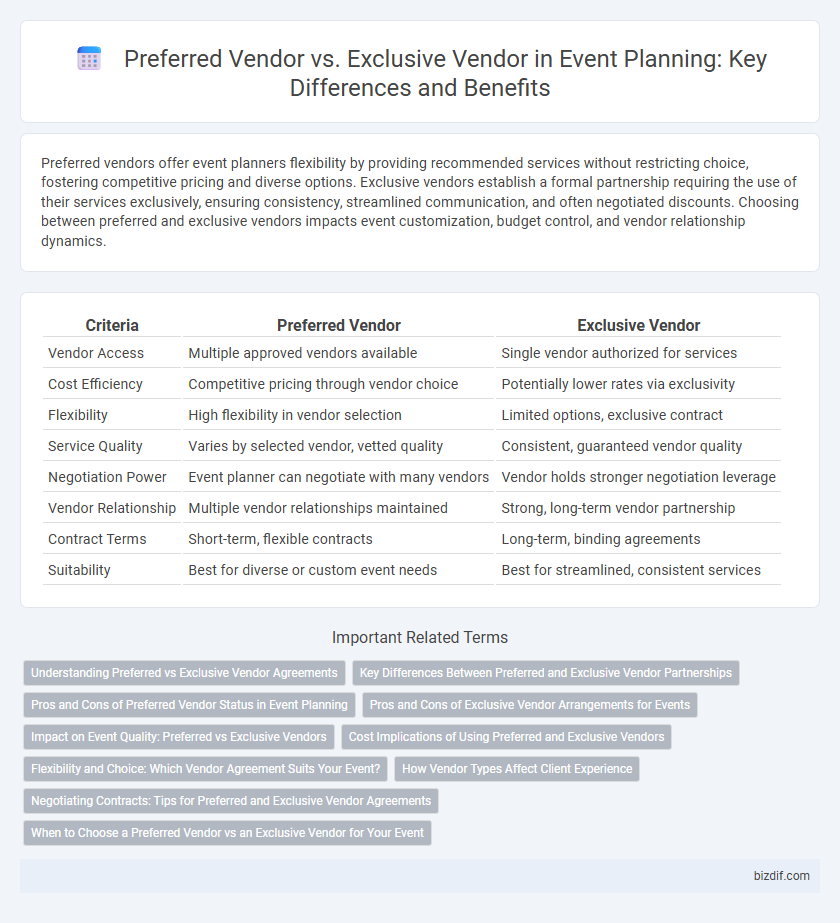Preferred vendors offer event planners flexibility by providing recommended services without restricting choice, fostering competitive pricing and diverse options. Exclusive vendors establish a formal partnership requiring the use of their services exclusively, ensuring consistency, streamlined communication, and often negotiated discounts. Choosing between preferred and exclusive vendors impacts event customization, budget control, and vendor relationship dynamics.
Table of Comparison
| Criteria | Preferred Vendor | Exclusive Vendor |
|---|---|---|
| Vendor Access | Multiple approved vendors available | Single vendor authorized for services |
| Cost Efficiency | Competitive pricing through vendor choice | Potentially lower rates via exclusivity |
| Flexibility | High flexibility in vendor selection | Limited options, exclusive contract |
| Service Quality | Varies by selected vendor, vetted quality | Consistent, guaranteed vendor quality |
| Negotiation Power | Event planner can negotiate with many vendors | Vendor holds stronger negotiation leverage |
| Vendor Relationship | Multiple vendor relationships maintained | Strong, long-term vendor partnership |
| Contract Terms | Short-term, flexible contracts | Long-term, binding agreements |
| Suitability | Best for diverse or custom event needs | Best for streamlined, consistent services |
Understanding Preferred vs Exclusive Vendor Agreements
Preferred vendor agreements allow event planners to collaborate with recommended suppliers who offer negotiated pricing and reliable services, but clients are free to choose other vendors. Exclusive vendor agreements bind event planners or venues to work solely with specific vendors, ensuring consistency and control but limiting flexibility in vendor selection. Understanding these distinctions helps event professionals balance cost, quality, and customization in event planning.
Key Differences Between Preferred and Exclusive Vendor Partnerships
Preferred vendors offer flexibility by allowing event planners to choose from multiple suppliers, ensuring competitive pricing and varied options. Exclusive vendors guarantee sole access to specific services or products, providing consistency and often enhanced coordination but limiting alternative choices. Understanding these distinctions helps planners balance control, quality, and cost efficiency in event execution.
Pros and Cons of Preferred Vendor Status in Event Planning
Preferred vendor status in event planning offers benefits such as established trust, streamlined communication, and often discounted rates due to ongoing partnerships. However, relying on preferred vendors may limit access to new, potentially innovative providers and reduce competitive pricing opportunities. Event planners must weigh the convenience and reliability of preferred vendors against the risk of missing out on fresh ideas and cost savings from a broader vendor pool.
Pros and Cons of Exclusive Vendor Arrangements for Events
Exclusive vendor arrangements for events streamline coordination by ensuring consistent quality and simplified communication, reducing the risk of mismanagement. However, relying on a single vendor limits variety and may increase costs, as comparison shopping and competitive pricing are restricted. Event planners must weigh the benefits of predictability and control against potential drawbacks like reduced flexibility and vendor dependency.
Impact on Event Quality: Preferred vs Exclusive Vendors
Preferred vendors offer flexibility by allowing event planners to choose from multiple trusted providers, enhancing the diversity and customization of event elements. Exclusive vendors may streamline coordination and ensure consistent quality by controlling all aspects of service delivery, but this can limit variety and innovation. The choice between preferred and exclusive vendors significantly impacts the event's overall atmosphere, creativity, and execution reliability.
Cost Implications of Using Preferred and Exclusive Vendors
Using preferred vendors often results in competitive pricing due to pre-negotiated rates and established relationships, offering cost savings without sacrificing quality. Exclusive vendors may charge premium fees as the event planner commits solely to their services, limiting negotiation opportunities but ensuring dedicated resources and consistency. Evaluating cost implications involves balancing budget constraints with the benefits of vendor exclusivity and preferred partnerships.
Flexibility and Choice: Which Vendor Agreement Suits Your Event?
Preferred vendor agreements offer event planners flexibility and a wider selection of trusted suppliers, allowing customization according to unique event needs and budgets. Exclusive vendor contracts limit choices by mandating a sole supplier, which can streamline coordination but may restrict adaptability and creative options. Evaluating event goals and the importance of vendor variety helps determine whether flexibility or exclusivity aligns best with successful event execution.
How Vendor Types Affect Client Experience
Preferred vendors offer clients a curated list of trusted suppliers, ensuring quality and reliability while allowing flexibility in choice. Exclusive vendors provide a single, often specialized option, which can simplify decision-making but limit customization and alternatives. The type of vendor arrangement directly influences client satisfaction by balancing consistency with personalization in event planning.
Negotiating Contracts: Tips for Preferred and Exclusive Vendor Agreements
Negotiating contracts with preferred and exclusive vendors requires clear delineation of service scope, pricing structures, and cancellation policies to protect both parties. Preferred vendor agreements typically allow event planners flexibility to engage multiple suppliers, while exclusive vendor contracts mandate sole use, often demanding more stringent terms and negotiation leverage. Thoroughly reviewing liability clauses and performance guarantees ensures risk management and fosters successful vendor partnerships.
When to Choose a Preferred Vendor vs an Exclusive Vendor for Your Event
Choosing a preferred vendor is ideal when you want flexibility in selecting multiple suppliers while benefiting from vetted quality and negotiated rates, especially for events requiring varied services like catering, photography, and AV support. An exclusive vendor is best suited for events demanding uniformity, streamlined communication, and guaranteed availability, often necessary for high-profile or large-scale corporate gatherings. Prioritize preferred vendors for diverse, customizable event needs and exclusive vendors when consistency and reliability are paramount.
Preferred vendor vs Exclusive vendor Infographic

 bizdif.com
bizdif.com